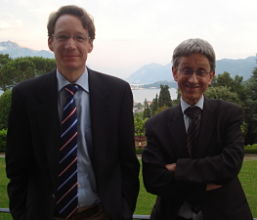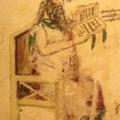150 - Charles Burnett and Dag N. Hasse on Arabic-Latin Translations
Posted on
A special 150th double interview episode on the transmission of philosophy from Arabic into Latin.
Themes:
Further Reading

Andalusia


 ..
..



Comments
Congrats, and natural philosophy
Congratulations on episode 150! I'm looking forward to the next 150. I do have a little question too: in this podcast natural philosophy was mentioned. Will we be hearing more about the things we now call science and mathematics in upcoming podcasts? As an atheist, and someone who is quite ignorant of the history of philosophy, I struggle to see much relevance in theology in the development of modern understanding of reality, but it's much easier for me to see the relevance of medieval proto-science and math.
In reply to Congrats, and natural philosophy by Bobb
Science and mathematics
Thanks very much! The issue about natural philosophy is tricky. On the one hand as you know I think it is an important part of our story and so I have included episodes on things like medicine, astronomy, and optics. On the other hand this isn't a podcast on the history of science (actually someone should do one!), so I need to limit my forays into these topics. In the near future, in any case, there will be an episode on astronomy and astrology in Jewish Andalusian thinkers. I will also think about whether I could highlight a topic along these lines in the later Eastern tradition.
In reply to Science and mathematics by Peter Adamson
Natural Philosophy
Hi Peter,
Thanks for the response. I understand (I think) the difficulty in discussing too much of the history of science in your podcasts, but that does that mean that the much of the history of philosophy is essentially the history of theology?
In reply to Natural Philosophy by Bobb
Science/theology
No, I don't think so. If you think about the topics I've covered since hitting the Islamic world, there has certainly been quite a bit about God but we've also looked at logic, the question of whether freedom is compatible with determinism, philosophy of language, ethics, epistemology (theory of intellect), cosmology, and political philosophy. Also I would point out that a lot of the major advances in philosophy in the medieval period were devised in the context of talking about God, they have a more general application and in fact went on to become more or less detached from the original God-centered context in which they were first used. A great example is Avicenna's conception of modality (necessity, possibility, etc), which obviously relates not just to his logic but also his metaphysics/theology; yet that is a big step towards Leibniz's concepts of modality. Or the problem of divine foreknowledge, which has had similar knock-on effects.
philosophers vs historians
Recently I exchanged views with Dr Adamson on the differences between methodologies in history and in philosophy on hopwag's facebook page. Dr Adamson invited me to continue the discussion on the website in the hopes that others might join the discussion.
Having established our opposing allegiances I wanted to ask Dr Adamson his thoughts on a major problem I have with Renaissance Studies. Dr Adamson is an especially interesting authority to question here because my view simultaneously critiques his methodology as well as credits the importance of his subjects.
I will keep this brief. For some time now I have maintained a preference for studies written by historians than those by philosophers. A year ago or so when I read Vere Chappell's 'Essays on Early Modern Philosophers' I couldn't help but find in the opening lines of her series introduction a kindred spirit. She distinguishes between an idea based methodology of the philosopher and a more factual and circumstantial based methodology of the historian. As a result I find there to be a widespread anachronistic imposition of a modern mindset unto Renaissance thinkers at the expense of the ontological conceptions in which their thought is necessarily based. On these grounds, I would accuse giants of philosophy of no lesser status than Paul Oskar Kristeller or Quentin Skinner of having obscured our understanding of Renaissance humanism and political philosophy, respectively. How ridiculous is it that the most influential text on political philosophy from the period is entitled 'The Foundations of Modern Political Thought'??!!
This exchange began a few days ago with me teasing Dr Adamson for his partiality towards the Liber de Causis that he fails to hide in this interview, and now we have mirrored the motion of the heavens and run full circle back to the same place. I wonder how far ameliorated our understanding of history might be if all authorities in Renaissance Studies shared Dr Adamson's fascination with the metaphysics of the period.
In reply to philosophers vs historians by Coniferous
Approaching history of philosophy
Thanks for the post. I am actually not entirely clear on what the difference of opinion is. Are you saying that, if it was up to you to decide what focus to choose, you would emphasize different philosophical themes, like political philosophy instead of metaphysics, epistemology and psychology? That would probably be a fair criticism in that political philosophy has never really been my thing, though I have included numerous episodes on it (like on Aristotle and on Farabi, or the interview with O'Meara about political philosophy in Neoplatonism).
Or is it more that you would want to see more discussion of the historical context of the thinkers, like where and when they lived, and what was going on in their environment that may have shaped their ideas? Again I think I do include quite a lot about that, but of course there is always a question of how to balance historical context and discussion of the ideas and arguments themselves. I suspect most listeners are more interested in the latter actually but would be interested to hear what people think about it.
Then the other thing you mention is the danger of anachronism, that we shouldn't impose our philosophical concerns and concepts on the historical figures. There I think I would want to plead innocent: as historians of philosophy go I think I am tending very far in the direction of understanding each thinker or movement "from the inside" and trying to be sympathetic to their worldviews. Indeed that's kind of what it is all about for me (cf the intro to the recent episode on Averroes on intellect).
In reply to Approaching history of philosophy by Peter Adamson
philosophers vs historians
My apologies, I was overly brief. You have missed my meaning. When I said I would critique your methodology I simply meant this in so far as you are a philosopher. I was not critiquing hopwag. As an expert on Neoplatonism, and granted your innocence concerning circumstantial neglect, I was curious to hear a most qualified expert explain if he has shared in my frustration that the obsessively metaphysical and theological motivation behind pre-modern thinkers is neglected in philosophy. I could say a lot more about how and why I think scholars like Kristeller or Skinner are guilty here but I thought it better to leave the question more general and let you comment on the neglect I have alleged. Somewhat coincidentally, the last few days I have been reading Niketas Siniossoglou's recent book length study on Plethon. I would argue she too could justly plead innocent where you have. Her thesis is essentially to argue that all the politico-socio-theologico controversy in the late Byzantine empire is firmly grounded in metaphysics. METAPHYSICS METAPHYSICS METAPHYSICS! There should be a single word that acts as a hybrid for metaphysics and theology. I would call it the salient motivator behind great minds in pre-modernity. I would like to see similar approaches to Dr Siniossoglou's taken in my area of interest, namely, Western Renaissance and Early Modernity Studies.
In reply to philosophers vs historians by Coniferous
Metaphysics metaphysics
Ah, ok - thanks, now I see where you are coming from. As it happens I actually know Siniossoglou a bit, because he (he's a he by the way, not a she) was at King's already before I left. His book is on my list of things to read for writing the Byzantine philosophy scripts down the road, but I haven't looked at it yet so can't say what I think about that. More generally I would agree that for a long, long period of the history of philosophy metaphysics/theology was the driving force at least for many authors. The scholarship on philosophy in the Islamic world tends to read it that way anyway, to be honest; I wonder if your frustration comes from having concentrated on Renaissance philosophy where people want to see a move towards "modernity" away from the classical Neoplatonic concerns, which tends to obscure that they are still to a large extent thinking like philosophers of late antiquity. My impression is that you would have this frustration less reading secondary literature on ancient Platonism or on medieval philosophy, in other words it may be a problem that is specific to Renaissance and early modern philosophy scholarship?
In reply to Metaphysics metaphysics by Peter Adamson
philosophers vs historians
Maybe there are pre-Greek texts that are equally neglected in ancient philosophy scholarship? But that is an entirely different matter, the task of reconstructing the mindset of a Hellene is quite a bit more difficult than that of a Renaissance man. Although my study of medieval latin philosophy has been limited to only a few dozen hours I would suspect you are correct that contextual neglect is indeed less marked there. Although, the historiography in this period is especially delicate involving slippery questions about the relationship between faith and good scholarship. Surely each period has its peculiarities and you could very well be right that Renaissance philosophy scholarship is more so neglectful of context.
That said, I think there is a more fundamental issue at stake here that Dr. Chappell eludes to in her above cited introduction. Generally, that those who receive their first degree in philosophy are trained to study ideas whereas the history student is trained to study people. Further, I would argue the methodology of the historian is preferable and that the philosophy student gradually shifts over as he or she becomes more advanced. Still the residue can be damaging like when the popularity of Skinner's work suggests that the early Italian humanists, the French jurists and the Spanish second-scholastics are only important in so far as they preview beheading a king or revolting against an overseas monarch. Or when Kristeller's work evokes images of Petrarch and Valla nostalgically sipping tea discussing literature with Gertrude, Bonnie and Gladice at my grandmother's book club.
And a final note on Bobb's comment above that neglecting science necessarily means studying theology. The radical opinion that might be extrapolated from my view is that maybe this should be the case! I was greatly pleased earlier this year to read Paola Zambelli's study 'White Magic Black Magic in the European Renaissance' where she introduces the book expressing her frustration with Renaissance Studies' anachronistic treatment of magic as proto-scientific and establishes as her methodology that she is going to treat Renaissance magic in its own right!!
In reply to philosophers vs historians by Coniferous
ideas vs people
Thanks, I really like your point about whether we are trained to study people or ideas. Obviously in my case it is idea-led, but ideas don't have themselves! I confront this issue when writing pretty much every script, for instance this week I've been writing about al-Tusi who had such an interesting life that I could spend the whole episode talking just about that. And he's also a good example of the fact that the ideas he puts forth can only be understood in light of his changing life circumstances, as you'll see when I reach him.
Ultimately I would say that I'm trying to do both - to understand the thoughts in their own right, but also why these thinkers' historical situation led to those thoughts. But it's a struggle to do both sometimes (especially in a 20 minute episode!).
Spread of Islamic Thought
Before the 12th century, how widely understood were Islamic philosophical traditions in Christian/Latin Europe? Do we know how common it was for scholars to learn Arabic for the purpose of reading texts in that language? To what extent were ideas from Arabic philosophy incorporated into the thought of Latin philosophers?
On a related note - what sort of understanding would Latin theologians/clergy generally have of Islamic religious philosophy? Would those understandings generally be more propagandistic, or true to the actual works?
Essentially - I understand that Islamic thought would have a great deal of impact after being translated into Latin, but how marginal was its influence before then?
Thanks!
In reply to Spread of Islamic Thought by Ben
Latin reception
I go into this quite a bit in episode 222, when I talk again about the Arabic-Latin translations. Basically the answer is first of all: no translation, no appreciable influence. There were a few figures working in milieus where both Arabic and Latin is being used but that is rare (I mention Gerbert of Aurillac as an early example in ep 222), so for real influence you need to have Latin versions. These start to come in basically in the 12th century, early on you get some medical translations and other scientfic stuff, with philosophy coming along roughly in the second half of the 12th c. And then obviously everything changes as a result and in the 13th century Avicenna is even more important on some topics than Aristotle, for a while at least.
Re your second paragraph, it's worth emphasizing that this reception is mostly of science and philosophy, not for instance kalam - even in the case of Ghazali, they know his Aims of the Philosophers where he summarizes Avicenna, but for a long time only that and not the Incoherence with its critique of Avicenna. There has been interesting work done on reception of the Koran in Latin; I don't know much about that. But it's safe to say that Latin philosophers are pretty ignorant of the full complexity of Islamic theology and even of the Koran (just look at what Aquinas says about Islam if you want an example of a smart person who is trapped within a simplistic and propagandistic cultural understanding).
In reply to Latin reception by Peter Adamson
Second order knowledge
That's very interesting, thank you. Would this ignorance also extend to second order knowledge of the Islamic traditions? For example, would people know *that* there are commentaries on Aristotle in Arabic, even if they weren't able to personally access them because of the language barrier? Or would it be an entirely closed book prior to the translation movement?
In reply to Second order knowledge by Ben
Second order
That's a good question. Apart from people on the front lines doing the translating and choosing which texts to render into Latin, readers would only, I think, have known about works mentioned internally in a translated text. So for example if Avicenna alludes in the Healing to another work of his own that was not translated, they could know about this through the Latin version of the Healing. In this way they also for instance did know something about kalam after all, because authors who were translated, like Averroes and Maimonides, allude to the Islamic theologians and even describe their views in some (usually unsympathetic) detail.
Arabic-Latin Glossary Link
Dear Prof Adamson,
The link to Prof Hasse's Glossary is dead. His list has been moved to this site: https://algloss.de.dariah.eu/
Thank you for your dedication to create these podcasts. I enjoy them very much and learn a lot from them.
In reply to Arabic-Latin Glossary Link by Jules Felix Culot
Hasse glossary
Oh right, I should have updated the link. I will do that now, thanks for pointing this out! Glad you enjoy the podcast.
Add new comment